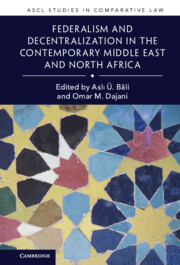Book contents
- Federalism and Decentralization in the Contemporary Middle East and North Africa
- ASCL Studies in Comparative Law
- Federalism and Decentralization in the Contemporary Middle East and North Africa
- Copyright page
- Contents
- Contributors
- Acknowledgments
- 1 Introduction
- Part I Theoretical and Comparative Context
- Part II Decentralization and Governance Reform
- Part III Decentralization and Self-determination
- Part IV Decentralization, Conflict, and State Fragmentation
- 15 Devolution and Federalism in Collapsed States
- 16 The Promise – and Limits – of Stabilization through Local Governance in Libya
- 17 Decentralization in State Disintegration
- 18 Decentralization in Yemen
- Part V Conclusions
- Index
15 - Devolution and Federalism in Collapsed States
Constitutional Process and Design
from Part IV - Decentralization, Conflict, and State Fragmentation
Published online by Cambridge University Press: 15 January 2023
- Federalism and Decentralization in the Contemporary Middle East and North Africa
- ASCL Studies in Comparative Law
- Federalism and Decentralization in the Contemporary Middle East and North Africa
- Copyright page
- Contents
- Contributors
- Acknowledgments
- 1 Introduction
- Part I Theoretical and Comparative Context
- Part II Decentralization and Governance Reform
- Part III Decentralization and Self-determination
- Part IV Decentralization, Conflict, and State Fragmentation
- 15 Devolution and Federalism in Collapsed States
- 16 The Promise – and Limits – of Stabilization through Local Governance in Libya
- 17 Decentralization in State Disintegration
- 18 Decentralization in Yemen
- Part V Conclusions
- Index
Summary
This chapter examines four cases of collapsed states from the Middle East and North Africa – Lebanon, Libya, Somalia, and Yemen. State collapse was marked by the breakdown of national institutions and the effective loss of a functioning central government. Different governance arrangements appeared across the territory of the country. This chapter discusses the nature of state collapse and its bearing on constitution-making processes and constitutional design. International actors may be drawn in as partisans of different factions or as potential mediators and facilitators of conflict resolution and state reconstruction. Peace-making requires the main factions to accept that the costs of fighting outweigh any benefits and to agree on structured negotiations. Sustainable peace requires agreements on governance, including potentially interim power-sharing, a constitution-making process, transitional security arrangements, and some guiding principles for a reconstructed state. While a federal or devolved governance arrangement may seem logical, the factional elites may prefer power-sharing at the center. If they do opt for a federal or devolved structure, they face vexing issues in defining the constituent units, the allocation of powers, and the nature of central institutions, which may result in an extended period of muddled governance and power politics with no constitutional clarity.
Keywords
- Type
- Chapter
- Information
- Publisher: Cambridge University PressPrint publication year: 2023

